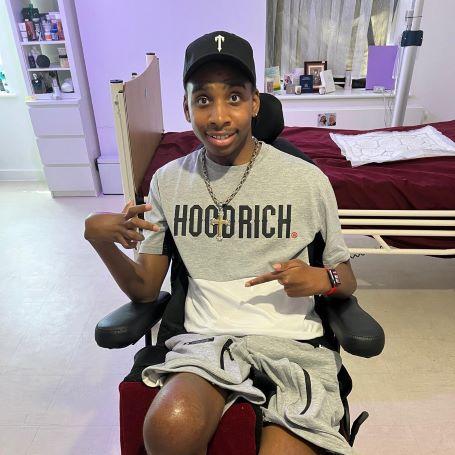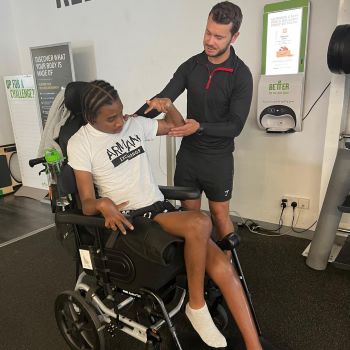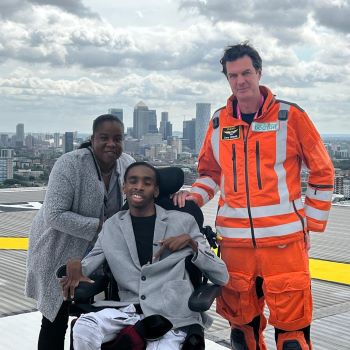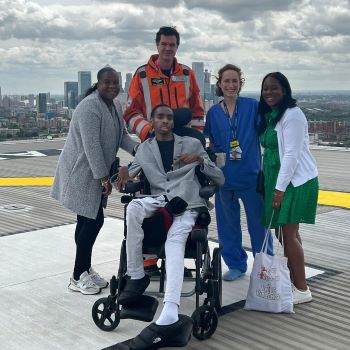4 Aug 2023

In February 2021, 17-year-old James was testing out his mother’s push bike when masked men attacked him for no reason, knocked him off the bike and stabbed him multiple times.
Sustaining numerous wounds to his chest, torso, arms and legs, the attack penetrated James’ liver, aorta and diaphragm, as well as puncturing his lung. James was in a critical condition and did not have time to get to hospital.
London’s Air Ambulance’s team was dispatched immediately and found James receiving CPR: his catastrophic bleeding had led to a traumatic cardiac arrest. His heart had stopped and he was lifeless.
On arrival on scene – with the help of London Ambulance Service – our advanced trauma team performed a resuscitative thoracotomy (open chest surgery) in order to compress his aorta, the main artery from the heart. The team concurrently secured central venous access which allowed them to give James a blood transfusion – these procedures are things only our team can do on scene in London. They then performed internal heart massage and luckily managed to get James’ heart beating again.
Dr Zane Perkins, the London's Air Ambulance doctor who attended to James, said:
"When we arrived, his heart had already stopped beating. We had to beat it ourselves, holding the heart in two hands and squeezing it."
James also had a general anaesthetic before being taken to the nearest major trauma centre, where he went straight to theatre for emergency surgery.
Due to the amount of time that James’ brain had not received oxygen while his heart was not beating, he sadly also suffered a hypoxic brain injury.
“We were told that we needed to prepare for the worst,” said Rachel Duncan, James’ aunt. “James’ heart was requiring support, his liver was badly damaged and his kidneys were failing.”
After surgery, James was admitted to the Intensive Care Unit (ICU). His chest needed to remain open as his body could not cope with the pressure of closing it. His chest remained open for nine days.
“The first few days in ICU, James suffered multiple cardiac arrests. But he fought for his life and was determined not to give up,” said Rachel.
In March 2021, James opened his eyes, but he was not responsive to external stimuli.
“We were told that his brain injury was so significant he would be in a vegetative state and that it was unlikely that he would emerge from it.”
James remained in ICU until 31 March, after which he was transferred to the High Dependency Unit (HDU). He stayed there until he was transferred to The Children’s Trust in August 2021. During his stay in the HDU, James suffered a brain-storming episode, which was effectively his brain beginning to rewire itself. In the process of this, James’ limbs became dystonic and physically appeared deformed, he lost a shocking amount of weight and fell below six stone.
 “It was said to us that James’ recovery looked bleak and he would not be the boy who we once knew. He would not remember who we are, he would not remember himself and the recovery would be a very slow process,” recounted Rachel.
“It was said to us that James’ recovery looked bleak and he would not be the boy who we once knew. He would not remember who we are, he would not remember himself and the recovery would be a very slow process,” recounted Rachel.
But, over the summer months, James began to emerge slowly from the vegetative state. He could not eat or drink – he is still fed by an intravenous line and feeding tube now – however he continued to make small improvements, like sticking his tongue out.
On his 18th birthday, James said ‘mum’ for the first time. This marked the start of James learning how to speak again. Occupational therapists and physiotherapists taught James how to move his limbs – even though he was still severely dystonic, James had movement in all his limbs and showed determination to utilise them.
With a great deal of support from his incredible family, James learned to sit up and also how to kick a football.

When he turned 18, James had to leave The Children’s Trust and was transferred to The Royal Hospital for Neurodisability in December 2021.
“It was here the physiotherapists, occupational therapists and medical teams really pushed James in his recovery and we saw his confidence and ability to try to do more increase,” said Rachel. “James re-learned to write his name and he participated in singing lessons which helped his speech. He’s also re-learned to cook, something which he thoroughly enjoyed.”
James was eventually discharged in May 2022.
“He spent a total of 449 days in hospital and of those 174 days in a major trauma hospital, after we had been told that he would not survive past 24 hours.”
As a consequence of the attack and hypoxic brain injury, James still faces significant mobility loss and remains in a wheelchair with speech difficulties. His mother Lisa is his full-time carer.

“James continues to defy the odds and we’re so proud,” said Rachel. “We’re so thankful he is still here with us.”
Rachel and her family have been campaigning against knife crime since James’ attack. “The impact of knife violence is devastating and I urge those who use knives or weapons to stop, I plead with you to stop. James was just doing what he loved when he was set upon by a group in an unprovoked attack. This should not have happened.”
James and his family recently spoke to the BBC about his journey: watch their feature here. You can also follow James’ journey and support their campaign by searching Sit Up & Stand Up 2 Knife Violence. The campaign is active on Twitter, Facebook, Instagram and YouTube.

